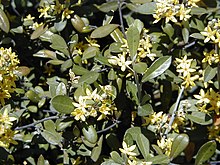Corokia is a genus in the Argophyllaceae family.[1] The genus was first described in 1839.[2] It comprising six species native to New Zealand, Australia and Rapa Iti.[3] Corokia species are shrubs or small trees with zigzagging (divaricating) branches.[4] In fact, Corokia cotoneaster is commonly known as wire-netting bush.[5] The stems of the shrubs are dark when mature, covered with downy or silky hairs (tomentum) when young.[4] In spring, they produce clusters of small, star-shaped yellow blossoms. Berries are red or yellow. The shrubs prefer forests and rocky areas, sun or light shade, reasonably well drained soil, and moderate watering.
| Corokia | |
|---|---|

| |
| Corokia virgata | |
| Scientific classification | |
| Kingdom: | Plantae |
| Clade: | Tracheophytes |
| Clade: | Angiosperms |
| Clade: | Eudicots |
| Clade: | Asterids |
| Order: | Asterales |
| Family: | Argophyllaceae |
| Genus: | Corokia A.Cunn. |
| Species | |
|
See text | |
Species
editSpecies found in the genus include:[3]
- Corokia buddleioides A.Cunn. (New Zealand, North Island)
- Corokia carpodetoides ( F.Muell. ) L.S.Sm. (Lord Howe Island)
- Corokia collenettei Riley (Rapa Iti)
- Corokia cotoneaster Raoul (New Zealand)
- Corokia macrocarpa Kirk (Chatham Islands)
- Corokia whiteana L.S.Sm. (Australia, New South Wales)
References
edit- ^ "Corokia A.Cunn". New Zealand Organisms Register. 2012. Archived from the original on 2017-05-18. Retrieved 18 May 2021.
- ^ Cunningham, A. (1839). "Florae insularum Novae Zelandiae precursor; or a specimen of the botany of the islands of New Zealand". Annals of Natural History. 3: 244–250. doi:10.1080/03745483909443232 – via Biodiversity Heritage Library.
- ^ a b "Corokia". www.theplantlist.org. 2013. Archived from the original on 2017-09-05. Retrieved 2021-05-18.
- ^ a b Eagle, Audrey Lily (2008). Eagle's complete trees and shrubs of New Zealand. Wellington, N.Z.: Te Papa Press. p. 516. ISBN 978-0-909010-08-9. OCLC 85262201.
- ^ "Corokia cotoneaster". New Zealand Plant Conservation Network. Retrieved 2021-05-18.